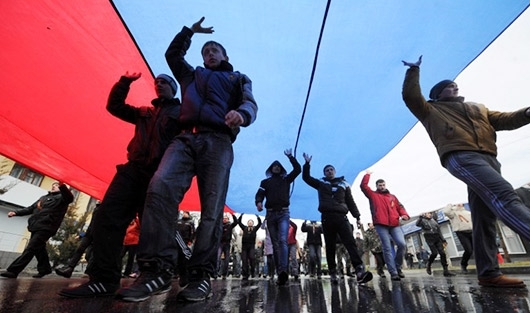Co-authored by William Witenberg a contemporary artist focused on abstract painting
It appears so. This is likely despite Geoffrey Pyatt, the American Ambassador to the Ukraine, warning that the US would not accept the results of the March 16th referendum in Crimea. The Ukrainian government, the European Union and the United States believe this referendum is illegal. This referendum is likely to only compound the existing problems. It is likely that the people of Crimea will vote, at a minimum, for more independence from the nation of Ukraine. The three choices presented in the referendum are for Crimea to become a region, a territory or an autonomous republic. None are acceptable to the Ukraine or American government.
Russian claims that ethnic Russian's in Crimea have been threatened and need to be protected, are rejected by the United States, as an excuse by Russia to occupy the Crimean peninsula.
After the referendum one can expect Putin to justify the occupation of Crimea from the referendum's results. This despite explicit warnings from Merkel, Cameron and Pyatt that increased sanctions and other measures will be brought if Russia uses the referendum as an excuse for its occupation.
Putin will likely ignore these threats to increase sanctions ,just as he has ignored the United States and European Union's actions to date. The rational for Russian presence in Crimea will change from concerns about threats to ethnic Russians, to a statement from Putin on how Russia is acting in response to the request from a region that was created by a democratic referendum.
While the United States has always supported the notion of democratic elections it has opposed the concept of areas within a country having elections to secede from a country. While the Crimean referendum involves issues between the United States and Russia; the coming Scotland referendum over its status within the United Kingdom, and the attempt by the Catalonia area of Spain to secede are essentially the same concept of an area within the boundaries of a country seeking to secede.
A salient point is that there is no more evidence that Russia is manipulating the referendum or somehow improperly interfering in it; then there is evidence that ethnic Russian's are in danger in Crimea.
Exactly what is America's interest when an area whether it is Catalonia, Scotland, or Crimea in effect secedes from their nations? It is one thing for America to object to Russian occupation it is another to object to the wishes of the people of an area. If the referendum is fair in the end how is the American interests served by increasing sanctions on Russia?
Surely the Crimean people should not be punished for the referendum anymore then the people of Scotland will be punished for their elections, nor will the Catalonia population be punished if they reject Spanish rule.
Surprisingly, the United States, Europe Union, and Ukraine threaten to bring more sanctions against Russia if the people of Crimea vote to withdraw from the Ukraine and become part of Russia.
The United States should view the referendum in Crimea as it would if Scotland or Catalonia voted to secede from their respective countries. Perhaps American interests would be better served by objecting to the occupation by Russia and not the referendum. Increasing sanctions on Russia because of the results of the referendum seems misguided.
